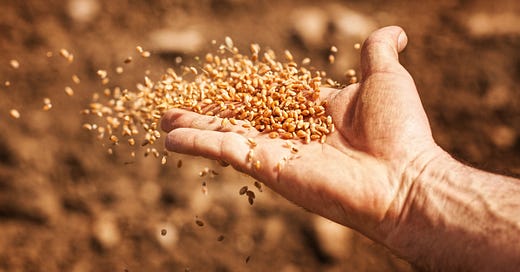Conference 6: Chock-a-Block
The seed is in our hearts and hands. It cries out, ‘Throw me; Sow me.’
We note this helpful definition:
Parable and allegory: whereas a parable makes a simple sharp point, an allegory takes up various details in the story and relates them, point by point, to aspects of a new situation.
Matthew’s third great discourse appears in chapter 13. It is ‘chock-a-block’ full of parables and allegories.
The new situation is the circumstances of the early church, with challenges abounding, particularly those of persecution and the new and vexed relationship between Christianity and Judaism.
The ‘Parable of all Parables’ (to my mind) is the Parable of the Sower (Matthew 13:3-9), with its allegorical interpretation in Matthew 13:18-23.
We try and be a little more perceptive – and receptive:
Where does the seed fall, what is the reception and response to the seed, what are the three failures and the three gains?
The sower sows the seed. Some falls on the path, some on rocky ground, some is choked to death by the weeds. We do fail. We are not always fruitful and faithful. Vigilance is necessary. Personal and communal ‘spiritual audits’ are needed, especially during Lent.
Yet life is not a ‘pity party.’ Prodigious yields result from sowing the seed:
The gains are hundredfold, sixtyfold, thirtyfold.
Who cares about the losses? The seed is widely thrown around precisely because the sower knows the gains far outweigh the losses.
By its very nature, the seed – the Word of God – yields an enormous harvest.
Are we convinced of the inner power of the Word of God? Have we let discouragement take over? Have we become pusillanimous?
The seed is in our hearts and hands. It cries out, ‘Throw me; Sow me.’
Matthew 13 rolls out the parables and allegories, one after another. After the Parable of the Sower, there is the Parable of the Weeds among the Wheat, the Parable of the Mustard Seed, the Parable of the Net, etc.
All parables are helpful for prayer. We need time to read them, let them sink in, and act upon them:
They are placed by Matthew in the heart of the Gospel because there is increasing opposition to Jesus; and people are asking why the Kingdom is so long in arriving and why the lack of acceptance for the Kingdom?
The Parable of the Weeds among the Wheat, for instance, helps us embrace reality. Good and evil exist in the world. In fact, they are intricately interwoven. But God works it out, not us. This is his domain, not ours.
Eradicating evil is not our mission. In fact, it is a grave distraction, one that Christians have fallen into throughout history. No, we are ‘sent to bring good news.’ We are not sent to eliminate evil.
The Parable of the Mustard Seed helps us to understand the tiny beginnings of the Kingdom, with its disproportionate outcomes. Hope is the word that comes to mind.
The Parable of the Yeast focuses especially on the hidden yet powerful nature of the Kingdom. Faith is the word that comes to mind.
Next time we feel opposition to the Kingdom; wonder why the Kingdom is taking so long to arrive; question the opposition to the Kingdom; sit down, take some time, and pray a parable.
Body, soul and spirit will be nourished and refreshed.
Amen.
Q. What is your favourite parable? Why? Might it be that it speaks eloquently to your strengths and weaknesses?


